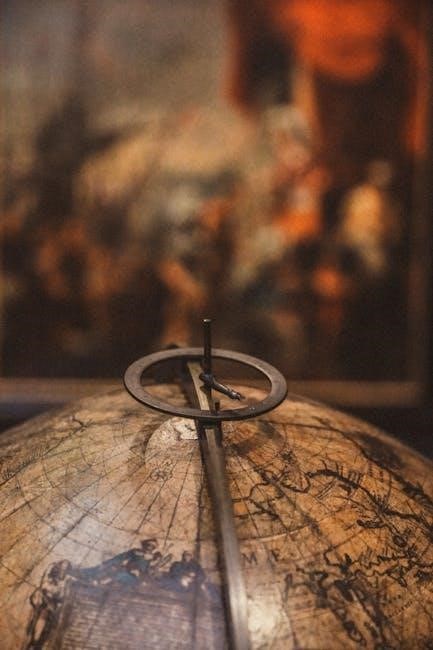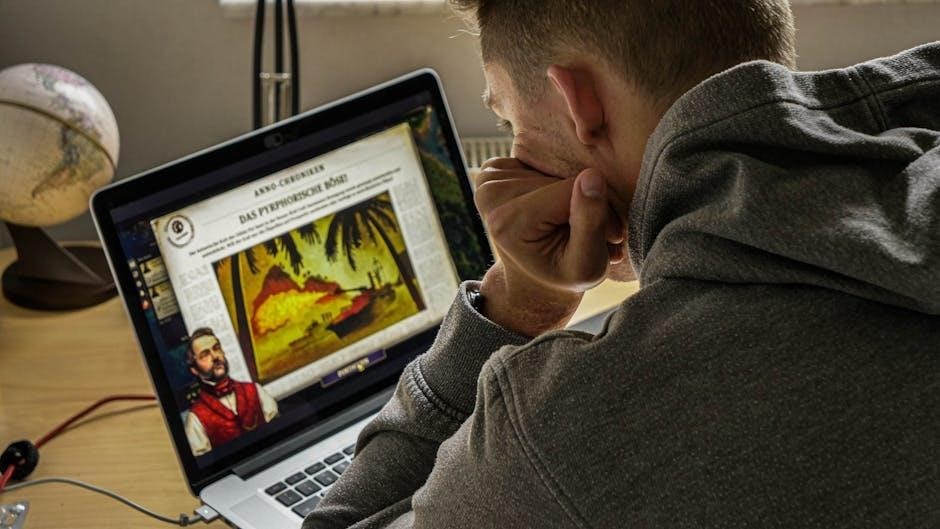The history of the world encompasses a vast timeline, exploring civilizations, events, and cultural developments from ancient times to modern globalization․
1․1․ Overview of World History
World history spans from ancient civilizations to modern globalization, covering key events, cultural movements, and technological advancements․ It encompasses the rise and fall of empires, religious influences, and societal transformations, offering insights into humanity’s development and interconnectedness across time and geography․
1․2․ Importance of Studying World History
Studying world history provides insights into human development, cultural diversity, and global interconnectedness․ It helps understand past societies, their achievements, and challenges, fostering empathy and a broader perspective․ By analyzing historical patterns and events, individuals can gain wisdom to navigate contemporary issues and shape a better future․
1․3․ Key Themes in World History
Key themes in world history include cultural evolution, political systems, technological advancements, and social dynamics․ These themes highlight humanity’s adaptability, innovation, and resilience․ They reveal how societies have interconnected, conflicted, and cooperated, shaping global development and addressing challenges like inequality, environmental change, and cultural exchange, offering lessons for understanding modern complexities and fostering a cohesive global community․

Ancient Civilizations
Ancient civilizations laid the foundation for human development, fostering agriculture, writing, governance, and culture, shaping the course of modern society and its complexities․
2․1․ Mesopotamia and the Cradle of Civilization
Mesopotamia, often called the “Cradle of Civilization,” was a region in the fertile Tigris-Euphrates river valley․ It is renowned for the emergence of some of humanity’s earliest urban centers, such as Ur and Babylon․ The Sumerians, who inhabited this area around 4500–1900 BC, developed significant innovations like cuneiform writing, which revolutionized record-keeping and communication․ They also made advancements in agriculture, governance, and architecture, establishing city-states with complex systems of administration․ The ziggurat, a massive stepped pyramid, stands as a testament to their architectural prowess․ Mesopotamia’s contributions laid the groundwork for subsequent civilizations, influencing legal systems, literature, and science․ Its legacy endures as a cornerstone of human progress and cultural development․
2․2․ Ancient Egypt and Its Legacy
Ancient Egypt, thriving along the Nile from circa 3100 BC to 30 BC, was a civilization marked by monumental pyramids, sophisticated mummification practices, and a complex pantheon of gods․ Their advancements in hieroglyphic writing, architecture, and medicine left a lasting impact․ The Nile’s annual flooding sustained agriculture, enabling the rise of a prosperous society․ Egypt’s legacy endures in art, science, and religious influences, shaping future cultures globally․
2․3․ The Indus Valley and China’s Early History
The Indus Valley Civilization flourished around 2500 BC, known for advanced urban planning, trade networks, and craftsmanship․ Ancient China’s early history includes the Shang Dynasty, marked by bronze technology and the origins of Chinese writing․ The Zhou Dynasty later introduced key philosophical concepts, shaping East Asian thought and culture for centuries to come․

The Classical Period
The Classical Period saw the rise of influential civilizations, including Ancient Greece and Rome, which laid the groundwork for Western philosophy, democracy, and law, shaping global culture․
3․1․ Ancient Greece and Rome
Ancient Greece and Rome were pivotal civilizations that shaped Western culture․ Greece excelled in philosophy, democracy, and the arts, while Rome expanded its empire through military prowess and legal systems․ Their contributions to governance, architecture, and intellectual thought continue to influence modern societies, leaving a lasting legacy in global history and cultural development․
3․2․ The Rise of Major Religions: Buddhism, Christianity, and Islam
Buddhism, Christianity, and Islam emerged as transformative forces, shaping cultures and societies globally․ Buddhism, founded by Siddhartha Gautama, emphasized enlightenment and compassion․ Christianity, rooted in Jesus Christ’s teachings, spread widely across the Mediterranean․ Islam, established by Muhammad, expanded rapidly, influencing law, science, and art․ These religions continue to shape human history, ethics, and global identity, leaving enduring legacies․

The Medieval Period
The Medieval Period, spanning the 5th to 15th century, saw the rise of feudalism, the spread of Christianity, and the Islamic Golden Age, shaping Europe and beyond․
4․1․ The Fall of the Roman Empire and Its Aftermath
The Western Roman Empire fell in 476 AD, marking the end of a centralized power and leading to political fragmentation․ This event, driven by internal decay and external pressures, ushered in the medieval period․ The aftermath saw the rise of smaller kingdoms, feudal systems, and the decline of classical institutions, reshaping Europe’s political and cultural landscape․
4․2․ The Rise of Feudalism in Europe
Feudalism emerged in Europe during the 9th and 10th centuries, particularly after the decline of the Carolingian Empire․ It established a hierarchical system where lords granted land to vassals in exchange for military and political support․ This structure created a network of obligations, shaping medieval society and governance․ Feudalism also led to the rise of localized power and the manorial system, defining Europe’s social and economic fabric for centuries․
4․3․ The Islamic Golden Age and Its Contributions
The Islamic Golden Age, spanning the 8th to 14th centuries, was a period of profound cultural, scientific, and intellectual advancement․ Scholars like Al-Khwarizmi and Ibn Sina made groundbreaking contributions to mathematics, medicine, and astronomy․ This era saw the preservation of ancient knowledge and the development of new ideas, profoundly influencing both Islamic and global civilization․
The Early Modern Period
The Early Modern Period, spanning the 16th to 18th centuries, saw transformative events like the Renaissance, exploration, and the rise of nation-states, reshaping global society and politics․
5․1․ The Renaissance and Its Impact on Society
The Renaissance, beginning in the 14th century, was a cultural and intellectual movement that transformed Europe․ It revived classical knowledge, sparking advancements in art, science, and philosophy․ Figures like Leonardo da Vinci and Michelangelo pioneered new techniques, while humanism emphasized individual potential and secularism․ This period laid the groundwork for modern society by fostering innovation and challenging traditional norms․
5․2․ The Age of Exploration and Colonization
The Age of Exploration, beginning in the 15th century, saw European powers like Portugal and Spain seeking new trade routes and resources․ Driven by economic and political motives, explorers like Columbus and Vasco da Gama established global connections․ This era led to the Columbian Exchange, transferring goods, cultures, and ideas between the Old and New Worlds, while also sparking colonization and its profound, often devastating, impacts on indigenous populations․
The Modern Period
The Modern Period saw rapid technological advancements, social transformations, and global interconnectedness, shaping contemporary societies and laying foundations for today’s complex world․
6․1․ The Industrial Revolution and Its Global Effects
The Industrial Revolution transformed societies through mechanized production, with steam power and textiles leading the change․ It originated in Britain, spreading globally, and spurred urbanization, technological innovation, and economic growth․ However, it also caused environmental degradation and social inequality, reshaping labor dynamics and laying the groundwork for modern industrialized economies worldwide․
6․2․ World Wars and Their Legacy
The 20th century’s World Wars reshaped global politics, economies, and societies․ World War I (1914–1918) led to the fall of empires, while World War II (1939–1945) resulted in the emergence of the United States and Soviet Union as superpowers․ These conflicts caused unprecedented destruction, loss of life, and led to the formation of the United Nations to promote peace and cooperation․
Contemporary World History
Contemporary world history explores the late 20th and 21st centuries, focusing on globalization, technological advancements, climate change, and shifting political landscapes that shape modern society․
7․1․ The Cold War and Its Impact on Global Politics
The Cold War (1947–1991) was a geopolitical conflict between the US and USSR, marked by political tension, proxy wars, and an arms race․ It shaped global alliances, spurred technological innovation, and influenced decolonization․ Key events like the Cuban Missile Crisis and the Berlin Wall symbolized its intensity․ The Cold War’s end with the Soviet Union’s collapse reshaped modern international relations and global power dynamics․
7․2․ Modern Challenges: Globalization, Climate Change, and Technology
Globalization has interconnected economies and cultures, fostering growth but also inequality․ Climate change poses environmental and socioeconomic threats, requiring global cooperation․ Technological advancements, while transformative, raise concerns about privacy, ethics, and job displacement․ These challenges demand innovative solutions to ensure a sustainable and equitable future for all nations and generations․
Key Historical Events and Their Significance
Major historical events, such as the invention of writing and the printing press, have profoundly shaped societies, cultures, and civilizations, impacting human progress and understanding․
8․1․ The Development of Writing and Its Influence on Society
The invention of writing marked a pivotal moment in human history, enabling record-keeping, communication, and knowledge preservation․ Early systems like cuneiform and hieroglyphs laid the foundation for modern scripts, fostering advancements in governance, culture, and education․ Writing standardized languages, facilitated trade, and allowed ideas to transcend time and space, revolutionizing societal progress and intellectual growth globally․
8․2․ The Invention of the Printing Press and Its Role in Knowledge Dissemination
The printing press, pioneered by Gutenberg, transformed knowledge dissemination by enabling mass production of books․ This innovation spread ideas rapidly, democratizing education and fueling movements like the Renaissance and Protestant Reformation․ It standardized languages, preserved literature, and laid the groundwork for modern information sharing, becoming a cornerstone of cultural and intellectual advancement worldwide․

Cultural and Intellectual Movements
Cultural and intellectual movements have been pivotal in shaping human progress, encompassing art, science, and philosophy across eras, fostering societal change and deeper human understanding․
9․1․ The Enlightenment and Its Ideas
The Enlightenment, spanning the 17th to 18th centuries, emphasized reason, science, and individualism, challenging traditional authority․ Key thinkers like Voltaire and Rousseau advocated for liberty and intellectual freedom․ Their ideas reshaped politics, education, and human rights, laying the groundwork for modern democracy and secularism․ This movement’s legacy continues to influence global thought and societal progress․
9․2․ The Scientific Revolution and Its Impact on Human Understanding
The Scientific Revolution, from the 16th to 17th centuries, transformed human understanding through empirical evidence and rational inquiry․ Figures like Galileo and Newton pioneered discoveries in physics and astronomy․ This era emphasized the Scientific Method, challenging traditional beliefs and fostering advancements in medicine, technology, and philosophy․ Its legacy reshaped knowledge systems and inspired future innovation․
The Role of Technology in Shaping History
Technology has driven human progress, from ancient tools to modern innovations, transforming societies, economies, and cultures․ It has enabled advancements in communication, medicine, and industry, reshaping global dynamics․
10․1․ Major Inventions and Their Historical Context
Major inventions like the printing press, steam engine, and internet transformed societies․ The printing press spread knowledge, sparking the Renaissance and Enlightenment․ The steam engine launched the Industrial Revolution, reshaping economies․ The internet connected the world, driving globalization․ Each invention emerged from specific historical contexts, addressing challenges and creating new opportunities for human progress and innovation․
10․2․ The Digital Age and Its Influence on Modern Society
The Digital Age revolutionized modern society through the internet and digital technologies․ It enabled instant global communication, transformed economies, and reshaped cultures․ The rise of digital platforms fostered innovation, connectivity, and access to information․ However, it also introduced challenges like privacy concerns and the digital divide, shaping a complex, interconnected world where technology drives progress and poses ethical dilemmas․
The Evolution of Global Governance
Global governance has evolved from fragmented systems to unified structures, with international institutions like the United Nations fostering cooperation and addressing global challenges collectively․
11․1․ The Rise of Nation-States
The emergence of nation-states transformed global governance, emphasizing sovereignty and centralized authority․ This shift, rooted in post-feudal Europe, led to distinct national identities and territorial boundaries, reshaping political landscapes and international relations․ The concept of nation-states became a cornerstone of modern global governance, influencing state formation worldwide and enduring through centuries of political evolution and conflict․
11․2․ International Organizations and Their Role in Modern Governance
International organizations like the United Nations and the World Bank play pivotal roles in modern governance, fostering global cooperation and addressing challenges such as economic development, human rights, and environmental sustainability․ These institutions facilitate dialogue and collective action among nations, promoting stability and unity in an increasingly interconnected world․
The Impact of Migration and Trade
The Silk Road exemplifies how trade and migration interconnected regions, fostering cultural exchange and economic growth, while globalization continues to shape modern economies and societies․
12․1․ The Silk Road and Its Cultural Significance
The Silk Road was a network connecting East and West, facilitating trade, cultural exchange, and the spread of ideas․ It promoted the exchange of goods, religions, and technologies, shaping global culture and fostering understanding between diverse civilizations․ This ancient route remains a symbol of interconnectedness and cultural richness in world history․
12․2․ Globalization and Its Effects on Economies and Societies
Globalization has interconnected economies and societies worldwide, driven by technological advancements and trade․ It fosters economic growth, cultural exchange, and access to resources․ However, it also leads to inequality, cultural homogenization, and environmental challenges, reshaping the modern world’s socio-economic landscape and presenting both opportunities and obstacles for global unity and development․
The history of the world reveals a journey of human growth, challenges, and transformations, offering insights into unity, diversity, and the collective pursuit of progress and understanding․
13․1․ Reflections on the History of the World
Reflecting on world history reveals a tapestry of human achievements and challenges, showcasing the evolution of civilizations, cultural exchanges, and technological advancements․ From ancient empires to modern globalization, history underscores humanity’s resilience and adaptability, offering lessons for future generations to navigate an increasingly interconnected world with wisdom and foresight, fostering global harmony and sustainable development․
13․2․ Lessons for the Future
History teaches us the importance of learning from past successes and failures to build a better future․ By understanding global challenges like climate change, inequality, and conflict, we can foster cooperation and innovation; Embracing diversity and promoting sustainable development will help future generations navigate an increasingly complex world, ensuring peace and prosperity for all humanity to thrive․
